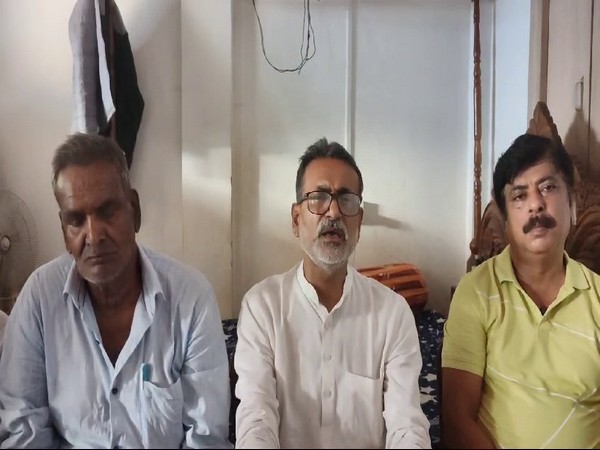Living under the yoke of Pakistani imperialism
May 11, 2020

By Dr Amjad Ayub Mirza
Glasgow [Scotland], May 11 : Pakistan occupied Gilgit-Baltistan (GB) has a population of just fewer than two million spread over 28,174 square miles.
Life in this region where once three empires -- British, China and Russia -- met is no different than that of any other subjugated people. In an interview to this scribe, Mr M, a human rights activist based in Gilgit, whose full name cannot be revealed due to fear of his safety, said: "Schedule Four and National Action Plan allow Pakistan to interfere in all administrative matters (of the former province of the Dogra princely state of Jammu Kashmir and Aqsa-e-Tibetha)."
Hence, all heads of departments are sent from Pakistan. Political freedom is absent. A barrage of Pakistan based political parties control the political and cultural narrative of GB. Local dissent is crushed brutally.
According to Defence Forum, India there is one Pakistani soldier for every 25 local inhabitants in Gilgit-Baltistan.
From Sachin, located in the eastern Karakorum rage in the Himalayas, to Chillas in the Diamer district bordering Khyber Pakhtunkhwa, Gilgit-Baltistan has been transformed into an army garrison. Hence no one (yet) dares to openly express his or her desire to join the Indian Union so that they can reunite with their brethren in Kargil and Leh.
Baba Jan, a human rights activist and environmentalist, is serving a 70 years sentence for demanding compensation for those who lost their homes due to the Attabad landslide in 2010, which triggered the formation of a lake drowning scores of villages.
Another human rights activist Iftikhar Karbalai is serving a 90 years sentence for raising his voice against the atrocities being committed against the local people.
Political and cultural oppression paves the way for economic exploitation. The federal government usurps the royalties of Indus River that flows through Gilgit-Baltistan before entering Pakistan. Not a single penny is spent on the development of the region. Tourism is attracted by (the matchless geographical wonders such as) world's second-highest peak the grand mount K-2, mount Naga Parbat, mount Deosai and Shangri-La.
However, the tourist information centre is based in Islamabad, the capital of Pakistan. All income received from tourism is collected by the Federal government. China and other countries pay no tax for using its airspace. No royalty for the use of Mount K-2 is paid to Gilgit-Baltistan either,' says Mr M.
The earnings from the exploitation of the human and natural resources collected by the federal government end up in the pockets of the Pakistani military establishment through defence budget and other perks. No wonders even today the people of Gilgit-Baltistan are forced to live in conditions that resemble the Stone Age.
The Pakistan Army through its proxies in Gilgit-Baltistan has resorted to all sorts of methods to divide and rule the local population. In his book -- The Gilgit Rebellion -- the then Political Agent of Gilgit Agency (1943-46 and 1947), Maj. Brown informs us that 'the rivalry between the Sunnis and Shias is extremely serious...and unless the situation is handled very carefully there is always the likelihood of a regrettable breach of peace.'
Social relations between nearly twenty different ethnic groups residing in harmony in the region broke down for the first time in the 1980s. Through their Punjabi and Pashtun Sunni proxies settled in Gilgit-Baltistan, Pakistan military began to instil sectarian discontent as a policy of oppression.
Today, the people of Gilgit-Baltistan face another challenge. Pakistan is conspiring to include Gilgit-Baltistan into its federation by making her its fifth province.
Hence, Prime minister Imran Khan, under the hawkish guidance of the Pakistani military establishment, is looking at the end of the term of the Gilgit-Baltistan legislative assembly on June 20 as an opportunity to stage a general election in the region and install a puppet government.
In order to guarantee the outcome of the elections, the federal government has obtained permission from, the Apex court to appoint a caretaker government during the interim period which, along with the Election Commission would scrutinise candidates and conduct a rigged general election.
The current political set up in the form of the current legislative assembly is actually Pakistan's method to institutionalise its oppression. To disenfranchise the public right of expression could lead to bloodshed along the 700 miles of River Indus that flows the length of the Gilgit-Baltistan intersecting the region. That would be a very heavy price that the people of Gilgit-Baltistan would have to pay for living under the yoke of Pakistani imperialism.
(Dr Amjad Ayub Mirza is a human rights activist from Mirpur in Pakistan occupied Kashmir (PoK). He currently lives in exile in the United Kingdom.)


















